Our guests today are Karol Piekutowski, farm manager, and Piotr Ptasiewicz, head of the combinable crops department at Farm Frites Poland Dwa. The farm is one of the most sustainable farms in Poland and celebrates its 30th anniversary this year. On this occasion, we asked our interlocutors to share examples of sustainable practices that they successfully apply on their farm.
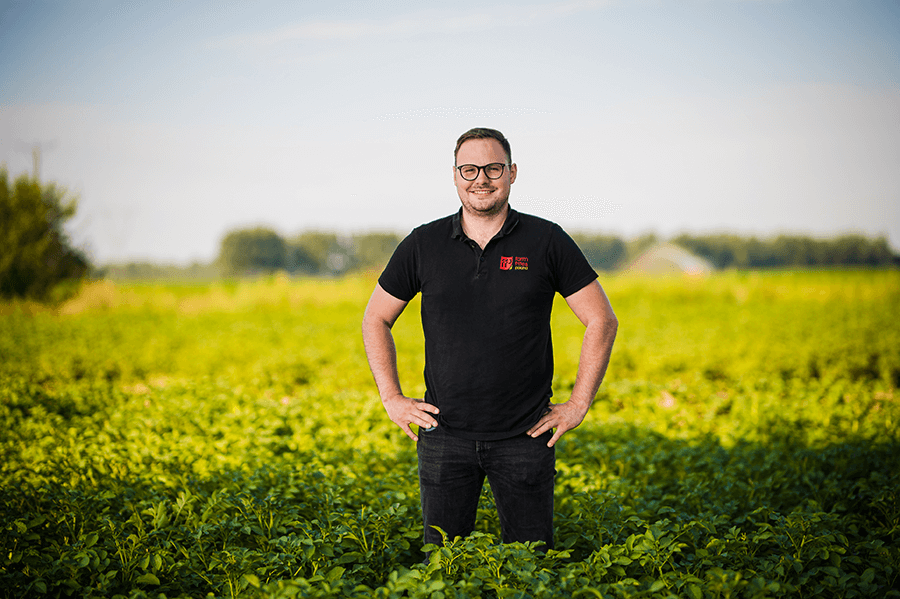
Can you tell us what do you think is the most important ingredient of the success of Farm Frites Poland Dwa? What gives you energy to act?
Karol Piekutowski: Our farm has always been staffed by people with a passion for agriculture, and in particular with a passion for potatoes😉. In my opinion, work without passion on any farm is not possible, because it is a very demanding profession that involves many sacrifices. The most obvious example is holidays – when people from other businesses are on vacation, we work in the fields. When required by the circumstances, we work on weekends, because farmers’ work requires adaptation to the cycle of nature. This type of work, without passion for what you do, would be simply impossible to maintain in the long run. Therefore, the success of the 30th anniversary of Farm Frites Poland Dwa is based on the daily commitment and hard work of all employees.
Piotr Ptasiewicz: I think the biggest driving force is people, and on our farm that is a large and diverse team of specialists who simply know their job. This is particularly important due to the fact that at different stages of cultivation there is a risk of making mistakes that we want to minimize as much as possible. The greatest satisfaction is during the time of harvest, which is in my area of responsibility – combine harvesters enter the fields and we start filling the silos. This is the wow moment. Even if the weather is not in our favor in terms of high yields, this is still the moment of greatest satisfaction for me. When we officially announce the yields during the harvest festival, each employee can take pride in having contributed their part to the results achieved. This makes us feel the meaning of the work we do.
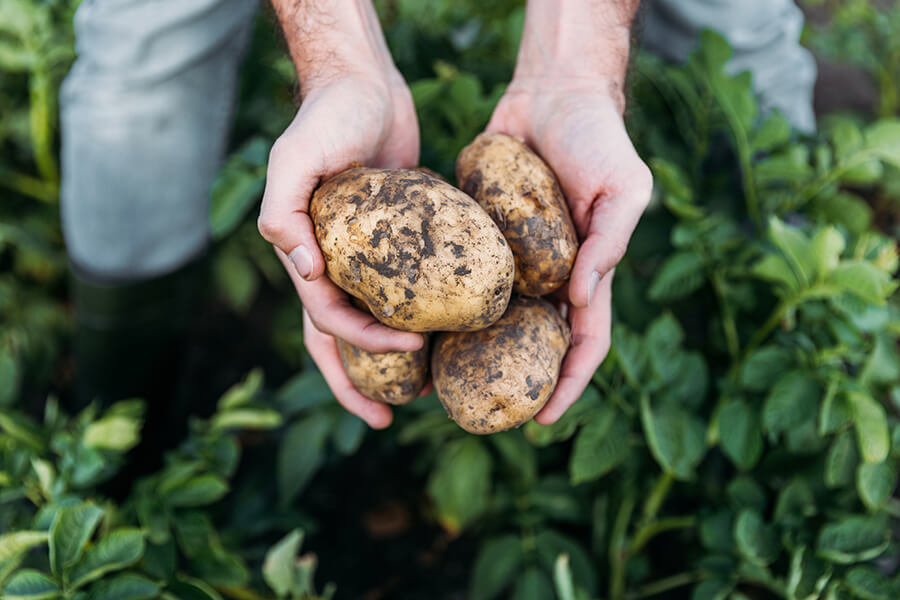
We met to talk about sustainability in agriculture. What does this mean for you in practice?
Karol Piekutowski: Running a farm in a sustainable way is an important element of our business model. This is due, among others, to the changing expectations of our customers – mainly the Farm Frites Poland production plant in Lębork, an example of which is the implementation of GlobalG.A.P. and Farm Sustainability Assessment (FSA) certification in our company.
We ourselves observe the negative effects of climate change on a daily basis and on a personal level we also try to work in such a way as to eliminate them as much as possible. That is why I think it is worth setting an example and starting the change with yourself. I think that as a farm we are up to date with the knowledge of sustainability of agriculture, which translates into the way we work. In our case, management involves responsibility for a large area – currently we have approximately 2500 ha, which means that we have a lot of challenges related to sustainable agricultural production. Despite this, we strive not only to meet all environmental requirements, but we also have the ambition to set trends in this area. This is one of the reasons why, as one of the few farms in Poland, we have the GlobalG.A.P. certificate for the entire farm, for all the crops we grow, including potatoes, cereals, rapeseed, peas and corn for silage. Although certification is not required by our customers (with the exception of potatoes) we decided to undergo a comprehensive certification process and implement the necessary practices in this area.
Many of the sustainability measures we take are standard practices for us, which may not be so obvious to other farms. However, our philosophy is that we want all our products to be certified and we want to constantly improve this aspect of our company.
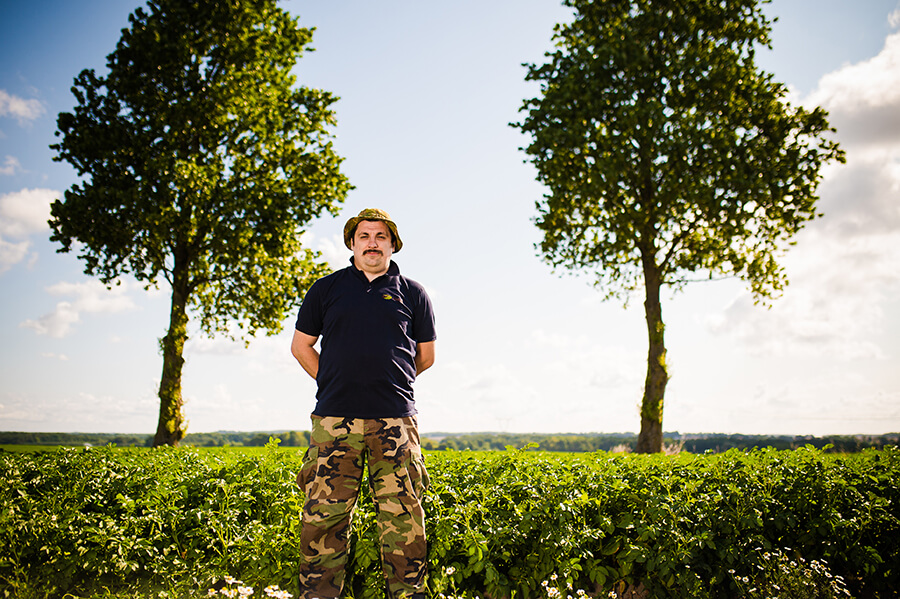
One of your activities is to conduct research on trial plots. Can you tell more about how this translates into increased sustainability of your farm?
Piotr Ptasiewicz: We conduct trials with Bayer, being assisted by Szymon Hoppe. These include, for example, trial plots with clubroot-tolerant varieties of rapeseed. Bayer provides us with seeds of rapeseed, which we sow, observe during the entire growing season, and then harvest, weigh, and draw conclusions from this. At least once a year, we compare our results with other nearby farms. Usually we have from 5 to 10 different varieties on our trial plots. Testing such a number of varieties allows us to determine which of them will perform in Polish conditions, because not always a variety that performs, for example, in the fields of Western Europe, will give the same yields in Poland. A particularly important parameter for us is the tolerance of rapeseed varieties to the clubroot types present in our soils. All these seeds also have resistance to siliqua cracking and seed shedding.
Bayer provides for trials not only seeds of the newest varieties, but even seeds that no one has yet sown. Thanks to this, we are the first to know how a given variety performs and after positive trial results we can sow these new varieties on a much larger area. We also share the trial results with nearby farms. This allows other farmers to introduce proven varieties that have good results without risk.
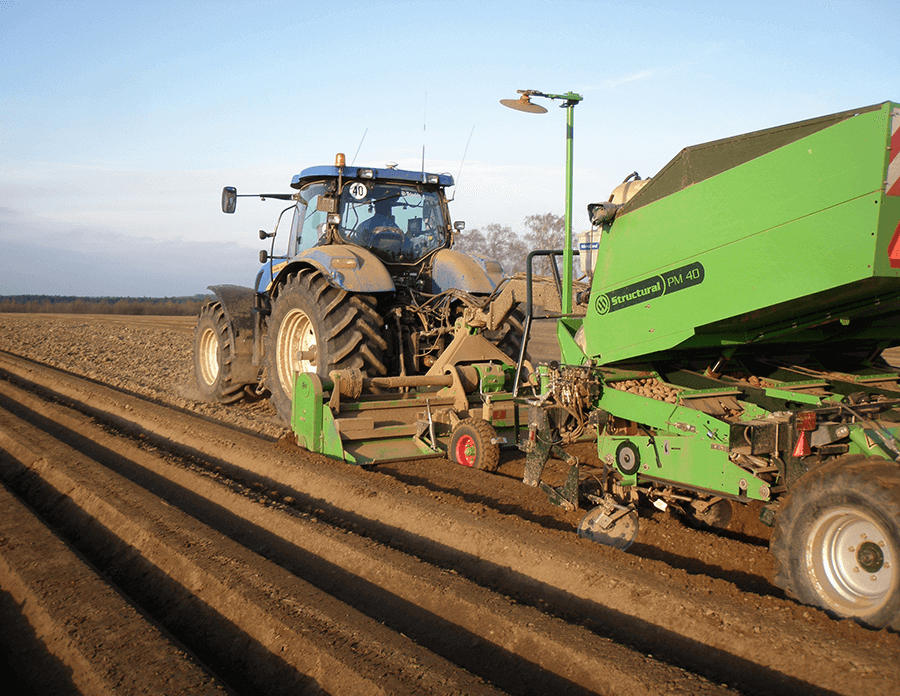
The direct benefits for the farm depend on the specific variety, e.g. some seeds supplied by Bayer provide increased resistance to fungal pathogens, and others provide resistance to siliqua cracking, which reduces the susceptibility of seed shedding. Of course the final yield potential of a given variety in the conditions of our farm is very important.
Our current trials focus mainly on the basic pathogen, that is clubroot which infects plant roots and affects the conduction and supplying nutrients to the plant. Therefore, the use of proper seeds with increased tolerance allows us to obtain proper yields, close to approximately 4 tons/ha, or even better. Of course, it depends both on the year and the weather conditions: availability of water, occurrence and severity of frost or ground frosts, length of winter, or on the other hand – duration of hot weather. We constantly monitor these conditions, and Szymon Hoppe from Bayer visits us at least once a month and together we assess the current conditions and their impact on the plants. Thanks to this, we can jointly make decisions about sowing dates, e.g. decide whether a given variety can be sown at a non-optimal time and whether this will affect the yield. We also consult other aspects of cultivation technology of rapeseed or other crops. Together, we are also considering the selection of varieties that do not require regulation, such as the selection of varieties resistant to verticillium wilt or yellows virus, which means fewer treatments with chemicals. Another example are rapeseed varieties that have genes that increase the elasticity of the siliquae, which reduces the plants’ susceptibility to drying and seed shedding.
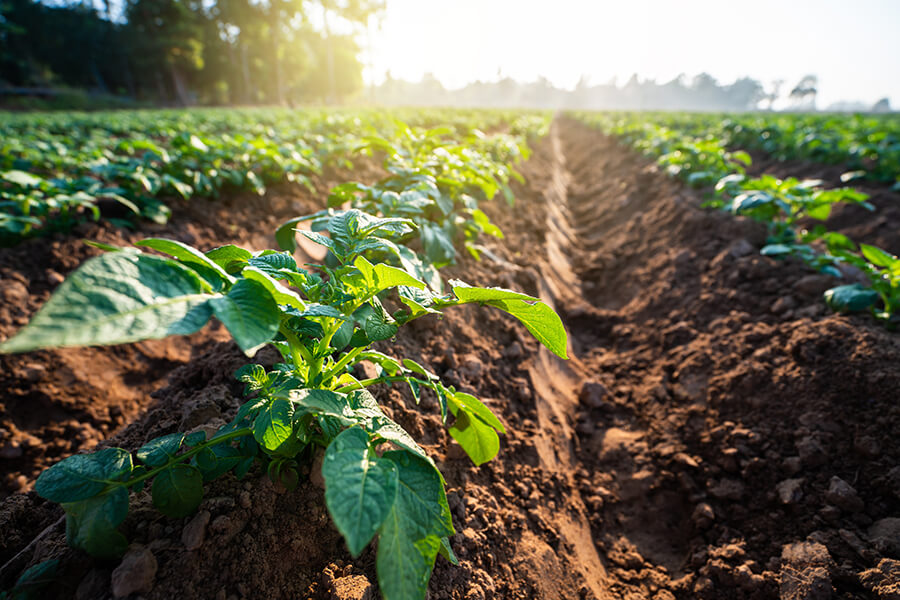
The right choice of varieties is one of the basic elements of implementing sustainable agricultural practices. Of course, the basis is the soil and crop rotation, i.e. planning crop rotation so that the plants do not interfere with each other, but help each other. Proper selection of seeds allows us to reduce the number and intensity of chemical treatments and limit the use of plant protection products. Further research directions that we are considering together with Bayer are the introduction varieties that will allow to reduce nitrogen fertilization or better use of it or to increase plants’ resistance to stress.
Moreover, together with representatives of the Bayer company – Szymon Hoppe and Marcin Kośmider, for 2 years we have been organizing field meetings in June for local and nearby farmers who can see, listen, discuss and assess the condition of plantations of rapeseed, cereals or potatoes on which Bayer products are used.
Can you tell us more about the challenges associated with fertilization and the use of plant protection products? How to do this in a sustainable way?
Karol Piekutowski: First of all, we use mineral fertilizers (potassium, phosphorus or calcium) in doses tailored to the nutrients content in the soil. This is possible thanks to regular soil tests and our sampling grid based on soil variability. Therefore, these are not standard measurements based just on 2-3 hectares of soil areas. On our farm, we first measure the electrical conductivity of the soil and only on this basis we designate homogeneous zones from which a sample is later collected. This allows us to obtain much more representative results than with the traditional method.
Another element is the use of section control in all our sprayers, which allows them to be automatically turned off over an area that has already been sprayed. As a result, we avoid double coverage of the same area, which saves plant protection products and avoids the so-called double overlay, which reduces the risk of phytotoxicity and reduces the amount of residues of plant protection products.
However, this is not all, because due to the increasingly limited list of plant protection products, we must also constantly learn how to use new solutions that replace those which are canceled. These include e.g. biological solutions. For example, the canceling of insecticide seed treatments with neonicotinoids in rapeseed cultivation against Delia radicum caused our farm to switch to the use of a completely biological solution throughout the entire area. Similarly, last year, for the catch crop between wheat / rapeseed and potatoes, we did not apply mineral fertilizers at all, replacing them with biological agents. And these innovative agrotechnical activities gave very good results.
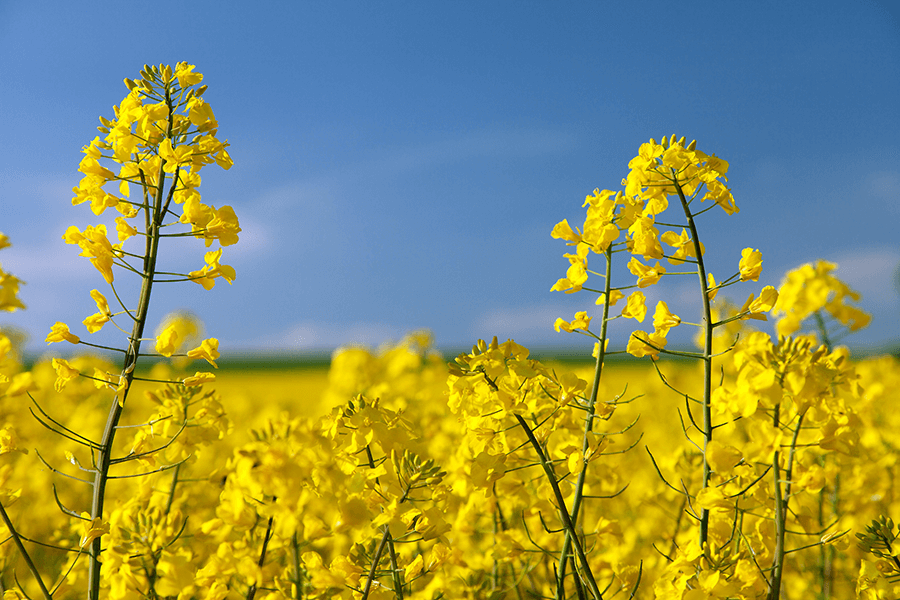
And what is your approach to regenerative practices?
Karol Piekutowski: Regenerative practices are one of the newest trends we are currently trying to implement. They are consistent with the principles of sustainable agriculture. An example of such actions is our gradual abandonment of plowing. Until now, about 75% of the farm was plowed, but now we plow soil only for potatoes, and for other crops only when necessary. We have been conducting no-plow cultivation tests for 4 years and the area of such crops increases every year. The year 2023 will be the first year in which the entire acreage of wheat and rapeseed will be sown without plowing.
Another element of regenerative practices that we have been using for many years now are catch crops. The straw is not removed from the field and is mixed with the soil, and if we sell straw, we replace it with manure. We try to constantly increase the amount of organic matter in the soil, which affects not only the quality of the soil, but also allows the sequestration of more carbon in the soil or the retention of more water in it.
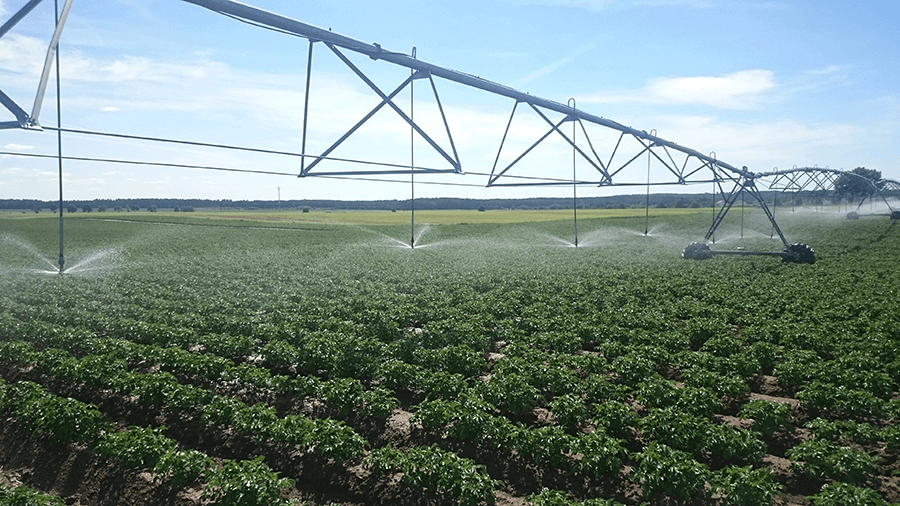
Exactly, what about water? What does it look like on your farm?
Karol Piekutowski: Currently, about 50-60% of the farm’s land is irrigated, and water for this purpose is drawn from the Łupawa River. We have four river intakes and seven deep wells. In irrigation at Farm Frites Poland Dwa, we also follow the principles of sustainability. First of all, we monitor soil moisture using point-based soil probes and support ourselves with a satellite service that determines evapotranspiration and water stress of plants. Thanks to this, we are able to calculate the water balance and determine for each crop whether it requires irrigation. In addition, two years ago we started installing reel GPS trackers on our sprinklers, which show us detailed information about the winding speed or pressure in real time, which allows us to write down historical data and manage irrigation. Our activities regarding rational water management are complemented by rainwater collection, which we then use for spraying. Certainly, we will increasingly try to use water from rainfall.
What is your approach to reducing emissions?
Karol Piekutowski: Of course, we also care about reducing unnecessary emissions. Our tractor and agricultural machinery operators are trained to drive machines at optimal engine speeds, taking into account both power and torque. In addition, our machines are equipped with GPS trackers and probes in fuel tanks, which allows us to analyze data and determine whether machines are idling unnecessarily. We have accurate monitoring of refueling and fuel consumption so we can react to possible deviations in this area on an ongoing basis. Another element of reducing emissions is the modernization of our cooling systems in potato storage facilities, where we have started to use a refrigerant that is not a greenhouse gas.
With our actions, we show that we are a modern farm that is constantly developing, looking for new solutions beneficial to our crops and the natural environment and meeting current challenges. This is the right path for us for the next 30 years.
Thank you for the interview!
